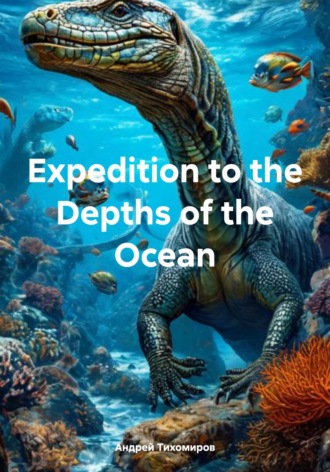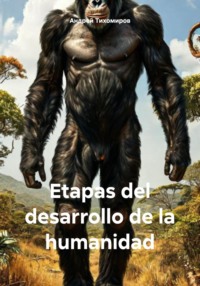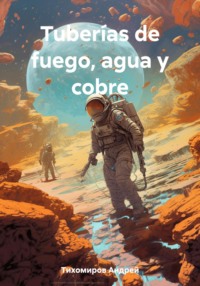
Полная версия
Expedition to the Depths of the Ocean

Андрей Тихомиров
Expedition to the Depths of the Ocean
One day, Academician Sergeyev called scientists to an important meeting. They were discussing who to send to search for a man named Vasilyev. This man was the only expert on sea serpents on Earth. He had collected a lot of information about the mysterious creatures from old books and newspapers.
Vasilyev really wanted to find the sea serpent, and no one could replace him. But the scientists understood that it was very dangerous. They decided to send the ship's captain to search. The captain was an experienced deep-sea diver, but he did not believe in the existence of sea serpents.
The scientists explained that Vasilyev could hide in the labyrinths under the water, where he could not be found without a ship. They suggested that the captain go on the search alone.
The captain was surprised, because it was very risky. He knew that in such places one could encounter many dangers. But the scientists insisted, and the captain agreed. Of course, if there had been at least one more expert on sea serpents, the commission could have thought about which of them to send. But there was no choice. It would be too cruel and unfair not to send Vasiliev on an expedition that he deserved more than anyone else in the world. But one way or another, it was too late to discuss why Vasiliev was sent on the expedition.
They said that he would have only one assistant – a research robot. The robot would help him collect information and transmit it to the surface.
The captain knew that he had a difficult and dangerous journey ahead of him. But he was ready to take the risk to find Vasiliev.
I understood what they were thinking. They believed that the Medusa submarine was stuck in a trap underwater and could not be pulled out. So, the passengers needed to be transferred to another boat. Medusa is one of the best deep-sea vehicles. It is designed to explore mountain ranges, narrow canyons and volcanoes. It has no equal in terms of safety. I have swum in the depths and have never seen a fish stuck in an underwater trap. And the latest model of the Medusa is also very sensitive to the environment.
– Who will be Vasiliev's partner? – I asked.
– Titov.
I knew Titov. He is a very calm and balanced person. He always follows all instructions, even if something is happening around him.
– And who will be the leader?
– Vasiliev.
Today I am surprised how they chose these people for the expedition.
– Vasiliev should not have agreed! – I said.
– Why? – Sergeyev was surprised. – He is a specialist.
– But you! – I insisted. Now I shared Salnikov's indignation. – How could you agree?
– Or maybe Titov should have been the leader? – Sergeyev looked at me coldly. – This is the first time I would send an expedition whose leader does not believe in its goals and does not know what to study. That would be wrong!
I remained silent.
Titov is a good specialist, but he deals with hydroacoustics, and not with what is needed for the expedition. There is some sense in Sergeyev's words.
– The famous deep-sea biologists were busy, – Sergeyev said, as if he had read my thoughts. – Of the free ones, none were suitable in character or qualifications.
Yes, Titov is an excellent deep-sea swimmer. But if we started with Vasilyev, then everything else fell into place by itself.
– After all, the trip was not considered dangerous, – Sergeyev noted. – No one ordered them to explore this area. They were simply cruising along the canyon – and that's it. What happened, no one knows.
– Tell me, – I asked directly, – do you yourself believe in this?
Sergeyev smiled.
– I understand your bewilderment. In the twenty-first century – and suddenly old sailor's tales. But, you see, whether these are tales or not, may finally become clear in our century. A paradox? There is no paradox. Zoologists are still arguing about some representatives of even land fauna, whether they existed or not. And when scientists discovered a lobe-finned fish last century, they didn't want to believe their eyes. It was believed that the last coelacanths had died out several tens of millions of years ago. And then they caught a few more coelacanths. So, do you think that fossil fish have started to come back? Nothing of the sort. Science expanded its search, and scientists began to come across more coelacanths.
– But somehow no sea snakes have ever been found, – I noted.
– There may be only one or two of these snakes, – Sergeyev said seriously. – And then they were found somewhere in their last refuge.
– For some reason, they used to catch my eye more often, – I said. – And they weren't embarrassed by people. If you believe the books that Vasiliev has.
– Vasiliev believes that sea snakes are deep-sea creatures, – Sergeyev explained just as seriously. – And their bodies were brought to the surface. The excitement, the wind and the imagination of people gave them the appearance of life. Then they were eaten by birds and fish. The creatures died out, and so they stopped being encountered. But perhaps one pair remained.
– And I…
– I am a scientist, – Sergeyev interrupted me dryly. – I need facts. And all sorts of "I believe" or "I don't believe" are not suitable for science.
– I just wanted to say, – I retorted right away, – that Vasiliev may be interviewing the last of the last serpents right now. And I will do everything to ensure that this interview is not lost for science. I can’t promise to bring you a sea serpent, but I will try to find Vasiliev.
My cockiness didn’t surprise them. They must have already known something about me.
– Excellent, – Salnikov said. – I have always believed that the correct choice of expedition members is half its success. When are you planning to leave, Captain?
– Fifteen minutes after you answer my last question.
– Speak.
– What do you know about Vasiliev’s character? You know him well, don’t you?
– Yes, of course. I want to tell you something that will help you find him.
– Exactly. I need to understand how Vasiliev would act in such a situation. I can imagine how a person of my type would act. But I know about Titov for sure. I can tell about his actions better than about mine. So, there is only one unknown on which everything depends. I am not a psychologist, but I will have to become one.
– It is difficult to say how a person will act in unexpected circumstances, – Salnikov said thoughtfully. – But I know one thing for sure: he is very stubborn. He adores snakes and collects them. Can you imagine what he is capable of if he has the opportunity to add to his collection? For example, to take a photo of a real snake or something unknown that we took for a snake. He is fearless. I don’t know if this is good or bad. He is a speleologist by profession.
– A speleologist?! – I rubbed my forehead. This is the last thing I needed! I remembered that I had recently read statistics from the Safety Control. It turned out that in terms of the number of accidents, speleologists occupy one of the first places among nature researchers. They climb into such narrow and dangerous places where even a small shift in rock can lead to disaster. The main reason for accidents is that researchers do not reinforce caves and underground passages before someone enters them. Those who had something happen to them usually wanted to first study the cavity they had discovered in its original state. And only then did they think about making emergency exits and installing protective nets. I remembered the advice of the Safety Control about how to combine science and safety. I wonder if Vasiliev got this important advice?
“I understand,” I said. “I’m leaving immediately.”
“They’re waiting at the airfield,” added Academician Sergeyev.
In the era of sailing ships, when sea serpents were encountered as often as storms and calms, any sea voyage began with a description of the ship.
“Medusa” is an unusual deep-sea vehicle. It does not look like the large machines that crawl along the ocean floor and collect ore, or like large research vessels. It does not have huge dimensions, powerful propellers, or comfort inside.
Imagine a ball of transparent material about two meters in diameter. This ball is surrounded by a flat ring, similar to an elliptical pancake. Closer to the ball it is thicker, and at the edges it is very thin.
Inside the ball there is a gondola, where I sit. It is so balanced that my seat and the seat of my partner, the instruments and control handles remain in place, no matter how the outer shell moves. "Medusa" can float in any position, and I will not even notice it.
They chose the right vessel for Vasiliev. "Medusa" can easily escape from the sea serpent or paralyze it with an electric charge, if necessary. We found Vasiliev.
I was sitting in the cockpit of a helicopter flying over the ocean. I decided to sit in the cockpit at the airfield, because it is faster and more reliable. This way I could control the landing process and be sure that everything will go well.
I thought about my friends – Vasiliev and Titov. Vasiliev was fearless, but his fearlessness sometimes seemed a little strange to me. And Titov always remained calm and collected, even in the most difficult situations.
Now they were together in the cabin, and I wondered: what would happen if they were alone in a tight space? What if something went wrong? I remembered how I had once seen adult hunters who had never shot before suddenly become completely different after their first shot. Maybe Titov would change too?
I looked at the photographs they had given me. One of them was a strange photograph taken by a TV camera from a ship. The picture showed a huge creature with three eyes and a wide mouth. It looked very scary, and its gaze made me feel uneasy.
This photograph reminded me that we were going on a dangerous journey. But I knew that my friends were ready for any challenges and would help each other.
You could be delighted by such a beast, even if you were not infected with Vasiliev's obsession. It is easy to imagine what the scouts would have felt if they had seen this monster face to face.
I turned the photograph over. On the back was a short note from a scientific protocol. The TV camera transmitted the picture. Then it was observed on the screen on board the ship: the open mouth suddenly approached the camera, a tooth flashed in the light, the observers saw something like a throat, and then it became dark. The cable to which the camera was tied stretched taut, like a fishing line when catching a large fish. Attempts to pull the camera out were fruitless. After a ten-minute struggle, when the cable was wound around the winch drum, then lowered to relieve the tension, it broke, and the monster that had swallowed the camera disappeared. Judging by the size of the camera, the creature that had dealt with it with such ease must have been quite large. Biologists had never seen anything like it and did not describe it in their books. A dispute broke out, into which Vasiliev unexpectedly intervened. Having seen a photograph that was broadcast on terrestrial television, he “identified” the monster as a sea serpent. As proof, he cited several thousand written testimonies and drawings by artists of past centuries.
One of these “proofs” was in my hands, in the same stack of photographs. A three-eyed monster with an open mouth was chasing a small vessel that was fleeing with all sails set. At the stern, one of the sailors was kneeling and stretching his arms to the sky. The body of the serpent was hidden in the water, only the hump-like tops of the thick rings were protruding above the surface. This did not quite match Vasiliev’s version that sea serpents rise to the surface only dead, but the “portrait resemblance” was almost complete.
“Captain, are you asleep?” they called out to me. A smiling Salnikov was looking at me from the screen.
“Everything is fine.” I'm trying to come up with some plausible version. I can't just search at random!
– Try it, – Salnikov encouraged me. – I flew in from vacation specifically to take part in the solution. And I've already heard at least a dozen hypotheses. Your thoughts are especially interesting.
– I'm starting from the most extreme assumption, – I said. – Something happened that made even a man like Titov forget himself.
Titov was still the ship's commander, and according to the instructions, he could disobey Vasiliev if the latter demanded, say, unreasonable actions from him. On the other hand, Titov, if he had undertaken something beyond the usual limits, would certainly have informed the ship cruising on the surface of his decision in advance. There is only one conclusion: he did not have time to do this. Something happened suddenly that immediately put Titov out of action. – For example, the Medusa ran into an underwater rock due to a radar error?
Конец ознакомительного фрагмента.
Текст предоставлен ООО «Литрес».
Прочитайте эту книгу целиком, купив полную легальную версию на Литрес.
Безопасно оплатить книгу можно банковской картой Visa, MasterCard, Maestro, со счета мобильного телефона, с платежного терминала, в салоне МТС или Связной, через PayPal, WebMoney, Яндекс.Деньги, QIWI Кошелек, бонусными картами или другим удобным Вам способом.









